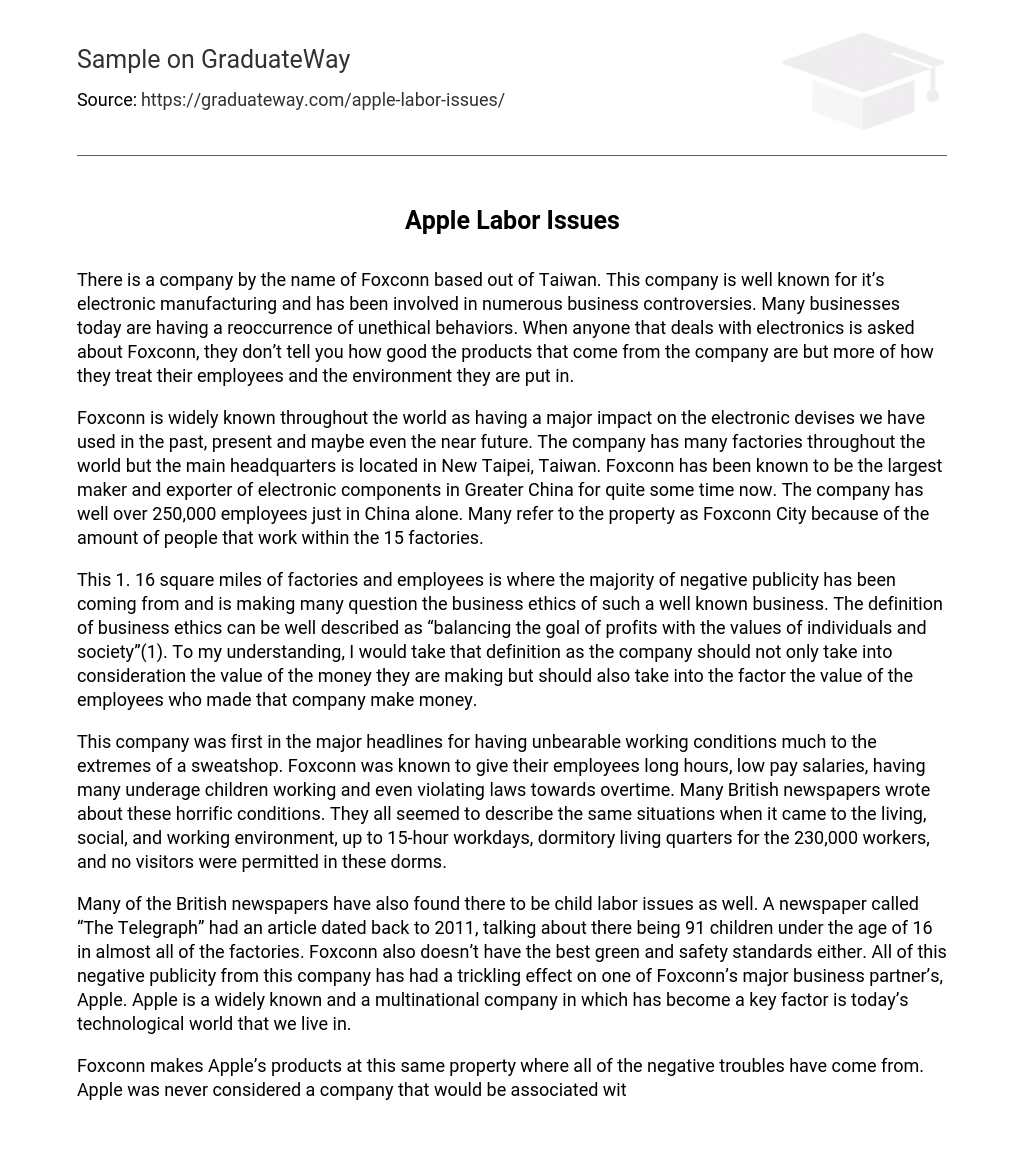Known as Foxconn, a Taiwanese company specializes in electronic manufacturing and has become infamous for its involvement in multiple business controversies. It is regrettable that numerous businesses nowadays persist in unethical practices. When conversing about Foxconn with individuals acquainted with the electronics industry, their attention often shifts from the quality of the company’s products to concerns regarding employee treatment and environmental conditions at their facilities.
Foxconn, based in New Taipei, Taiwan, is a renowned global player in the manufacturing of electronic devices. It has multiple factories worldwide and has greatly influenced the development of our current electronic devices. Foxconn holds the distinction of being the biggest producer and exporter of electronic components in Greater China, employing more than 250,000 workers solely in China. Known as Foxconn City, its facilities encompass 15 factories that provide employment to a substantial workforce.
This 1.16 square miles of factories and employees is generating unfavorable attention and casting doubt on the ethical practices of a prestigious company. Business ethics can be defined as “balancing profitability goals with considerations for individuals and society” (1). In my understanding, this implies that the company should not solely prioritize financial gains but also recognize the significance of its employees in contributing to their accomplishments.
This company became widely known for its unbearable working conditions, which were similar to those found in a sweatshop. Foxconn gained notoriety for forcing its employees to work long hours and pay them very little, as well as hiring underage children and ignoring overtime laws. Multiple British newspapers reported on these shocking conditions, with all accounts describing the same experiences regarding the living, social, and work environments of the workers. These included exhausting 15-hour workdays, overcrowded dormitories housing 230,000 workers, and strict limitations on visitors in these accommodations.
Many British newspapers have also discovered child labor issues in addition to the problems found in Foxconn’s factories. “The Telegraph” published an article in 2011 revealing that there were 91 children under the age of 16 working in these factories. Moreover, Foxconn lacks proper green and safety standards. The negative publicity surrounding Foxconn has had a ripple effect on its major business partner, Apple. As a well-known multinational company, Apple plays a crucial role in today’s technological world.
Foxconn, Apple’s manufacturing partner, operates at the same facility where all of the negative issues have arisen. Apple, which was never expected to be linked with a company like Foxconn, has unfortunately been affected by its tarnished reputation. Numerous protests and incidents of suicide among Foxconn employees have been reported, mainly due to poor working and living conditions. Given these circumstances, it raises a valid concern about Foxconn’s moral standards in conducting business.
The majority of workers at Foxconn received slips for overtime indicating that they had worked “98 hours in overtime for one month” (2), which exceeds the legal limit of 36 hours. The company has admitted that some employees have exceeded the legal overtime limit. Despite these violations and numerous negative reports, Foxconn faced further criticism. According to a news article from “Business Insider,” employees were paid “$1.8 an hour” (3), and during periods of high demand for the iPad, they were only “allowed 1 in 13 days off” (3). Additionally, the company prohibited employees from talking while working due to concerns about productivity.
Foxconn has faced heavy criticism and condemnation for its unethical treatment of employees. The company’s disregard for morality is evident in how they treat workers, leading to suicides, protests, and public backlash. Despite these issues, one would expect Foxconn to realize the need for change before losing major contracts. Many of their actions violate ethical and legal standards. Employing underage workers is both morally wrong and illegal, as is the blatant violation of overtime regulations. It is astonishing that despite widespread knowledge of these violations, Foxconn manages to avoid punishment. In an effort to restore its reputation, Apple has expressed its commitment to pressuring Foxconn into improving employee treatment and complying with laws.
Although not the most terrible, Apple’s sweatshops are highly rated and have faced criticism. To show their dedication to enhancing working conditions at Foxconn, Apple can implement different strategies. One possible method is involving a survey company to conduct interviews with a specific number of factory workers and collect direct perspectives. By considering the employees’ input, Apple can then tackle the main issues that were identified as the most problematic.
Apple conducted a survey and partnered with a non-profit organization to inspect the factories that manufacture their products. The purpose was to gain a better understanding of the difficulties these factories encounter. As a result, Apple required Foxconn to provide financial compensation for any workers under the legal working age employed at their factories. This compensation would continue for 6 months or until the workers turned 16 years old. If Foxconn were to extend their level of care and attention to their employees as they do in producing electronic components, they could transform into an outstanding company with a positive public perception instead of the negative reputation it currently possesses.
Despite still having a negative image, there is still hope for improvement if the company accepts Apple’s assistance. Works Cited 1. ) Twomey, David. Business Law. Mason:Southwestern. 2011. Print 2. ) Chang, Gordon. ”Suicides at Apple Supplier in China”. Forbes. com. May28,2012. 3. ) Pague, David. ”What Cameras Inside Foxconn Found”. New York Times. February 23, 2012. 4. ) Moore, Malcom. ”Apple Child Labor Issues Worsen”. The Telegraph. February 15, 2011





